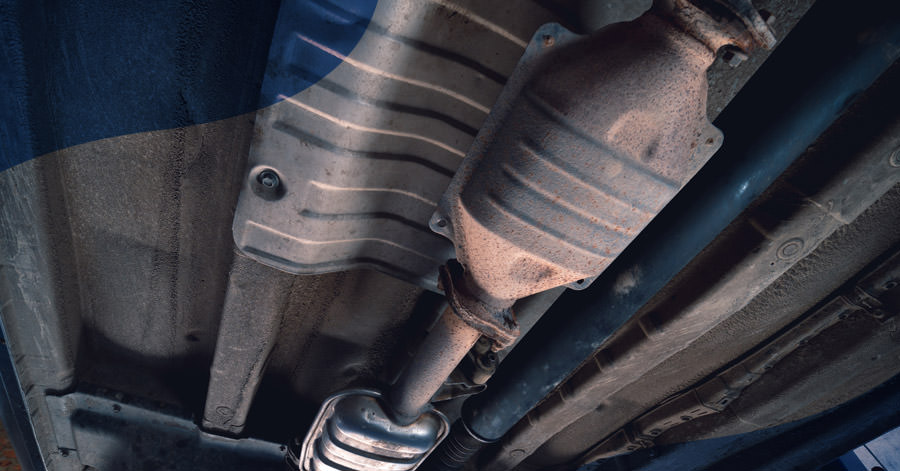- Home
- »
- Blog
- »
- Car Insurance
- »
- Does car insurance cover catalytic converter theft
Elephant Insurance - Listen to the Blog
Does car insurance cover catalytic converter theft?
With the continued rise of catalytic converter thefts being reported, you may be wondering what to do should it happen to you. Is catalytic converter theft covered by insurance? Is there a specific type of catalytic converter theft insurance?
If you recently had your catalytic converter stolen, check with your carrier before buying a replacement. Comprehensive coverage pays for catalytic converter theft.
What is a catalytic converter?
First and foremost, a catalytic converter is an integral part of a car’s emissions system. They reduce the amount and severity of the pollution that comes out of your car’s tailpipe whenever you go for a drive and impacts your vehicle’s engine performance. Catalytic converter designs vary slightly among different car manufacturers, but in general they are oblong or cylindrical in shape and bear a resemblance to mufflers. Do all cars have catalytic converters? Yes! Both older vehicles and modern cars have catalytic converters. As for where your catalytic converter is located in your vehicle, being part of your vehicle’s exhaust system, it sits between the engine and the muffler, typically a bit closer to the engine.
What are they made of?
- Palladium is a lustrous, silvery-white metal mined primarily in Russia and South Africa. Though probably a bit less well-known than other precious metals, and generally mined only as a secondary material, it’s actually one of the most valuable — since early 2016, the price of palladium has risen above the price of gold. Palladium is used in jewelry, dentistry, and electronics, but about 85% of all palladium mined ends up in catalytic converters.
- Rhodium is another silver-white metallic element. It is highly reflective, corrosion-resistant, and is, though not the most well-known, the rarest, most valuable precious metal in the world. Rhodium is used as a glass-strengthening alloy, a coating added to jewelry to protect against tarnish and scratches, and, primarily, in catalytic converters.
- Platinum is another precious metal, which is highly resistant to corrosion and tarnishing, soft and malleable, unaffected by common acids, and does not oxidize. It, like palladium and rhodium, is used in jewelry. However, it is also used in pacemakers, medication, magnets, electrical contacts, and (you guessed it!), catalytic converters.
Why are people stealing catalytic converters?
The catalytic converter has become extremely vulnerable to theft over the past few years because of the precious materials it is made of. Inside of every catalytic converter, there are rare metals (palladium, rhodium and platinum) that are used as catalysts to create the chemical reaction that converts harmful gases into safer substances. Thieves sell the metals inside converters to scrap yards for several hundred dollars per unit. Why now? While there was already a limited global supply of these metals, the pandemic and its related supply chain disruptions have made the spiked current value of these metals, resulting in price increases.
How much does a New Catalytic Converter cost?
Although the part is relatively small, it can be very pricey to replace. The price will vary depending on the make and model of the vehicle. The average price is around $1,000. The cost may be higher due to labor costs, and it could cost substantially more if there’s additional damage to surrounding areas.
For older-model vehicles, it’s not uncommon for a stolen catalytic converter to produce a total loss, although the car is otherwise undamaged. When this happens, it’s the owner’s choice between accepting the total loss settlement and replacing the vehicle, retaining the car on a salvage policy and repairing it, or choosing not to repair the car.
According to the United States Environmental Protection Agency, driving without a catalytic converter may violate emission laws. If you live in an area with no emissions requirements, you may wish to forgo repairs, but be aware that the exhaust will be substantially more toxic than regular exhaust.
How can you avoid having your catalytic converter stolen?
There are a few simple steps you can do to protect your car from a catalytic converter thief:
- Know if you’re a target: See if you drive one of most common vehicle type listed above.
- Mark your catalytic converter: Paint your converter a high temperature fluorescent paint or have it etched with a VIN number.
- Park Securely: Park in a secure a garage if you have the option to or park in busy, well -lit areas, away from any suspicious activity.
- Surveillance: Install an anti-theft device, set up an alarm, or set up a security camera.
Following these simple steps will at least prevent your car from being an easy target.
How will I know if my car’s catalytic converter is stolen?
That’s a great question. You will know your catalytic converter is has been stolen if you smell carbon monoxide, you hear a roaring sound or a loud rumbling while driving your vehicle, sounds coming from your exhaust pipe, your car drives rougher, your check engine light is on, there are smoke fumes in the main cabin of the car or there is a noticeable reduction in low-end torque (or a noticeable difference in the car’s handling when you change speed). If your vehicle isn’t working properly, you can always get an emissions test or check yourself to see if your converter is still underneath your car and in place with the rest of your vehicle exhaust systems.
What should I do if my vehicle’s catalytic converter is stolen?
If your catalytic converter is stolen, you should contact your local police department and file an official report. Your next call should be to your insurance agent to figure out if catalytic converter theft is covered by your insurance package. Then you’re going to want to get your car to an auto shop. While the car is still technically drivable, it may not be functioning properly. It is illegal to drive without a catalytic converter, not to mention its detrimental effect on the environment. So, considering these potential problems it is best to avoid driving your car if possible.
Is Catalytic Converter Theft Covered by Insurance?
Because the catalytic converter is part of the vehicle that’s permanently installed, its theft and catalytic converter replacement will be covered under the vehicle’s comprehensive coverage. The comprehensive deductible will apply, and the insurance company will inspect the vehicle to assess the full extent of the damages and offer settlement accordingly.
If a car does not have comprehensive coverage, the theft would not be covered. This means that vehicles with a liability-only policy cannot be covered for any type of theft or vandalism.
In most cases, comprehensive insurance is very cheap to add to a policy; unless your vehicle is very old and not worth repairing, it’s a good idea to carry comprehensive coverage.
If you’re not sure what coverages you carry on your policy, you can check with your insurance agent. Elephant customers can easily check their account information online. And if you don’t already have comprehensive coverage for your vehicle, reach out to Elephant and get a quote today.
Article last updated on November 11th, 2024 at 3:08 pm

